
VOL. I NO. 8 DELHI, THURSDAY NOVEMBER 5, 1942

|
A.V.G. SUCCESSORS MAKE EXISTENCE SAD FOR JAPS
Since the activation of the fighter group, replacing the A.V.G. July 4th, two pilots have distinguished themselves as Aces. The first pilot to achieve this signal honor was Captain Baumler of a Fighter Squadron. Captain Baumler brought down his fifth plane (a Japanese I-97II) south of Hengyang on September 3rd. He had previously destroyed seven Axis planes while in Spain. The second officer with the distinction of becoming an ACE was Colonel Robert Scott, Commanding Officer of the 23rd Fighter squadron. Colonel Scott was credited with his fifth plane when, after he had completed a mission, saw a twin-engine fighter, immediately made an attack and looking back saw it go down in flames. Several former A.V.G. pilots who are now continuing their excellent work with the Air Corps. are creeping rapidly toward their goal of five. Although nearly all of these officers have more than enough planes to qualify, those with which they were credited during service with the A.V.G. cannot be counted for their ACE rating. Such officers and numbers of planes to their credit since July 4th are as follows: Major David L. Hill - 3; Major Edward F. Rector - 2; Major John G. Bright - 2; Major Charles W. Sawyer - 1. ONE EACH The following pilots have one confirmed victory: Lieut. John D. Lombard, Capt. Edmund Goss, Lieut. Dallas A. Clinger, Lieut. Mark A. Mitchell, Lieut. Mortimer D. Marks, Lieut. Martin S. Cluck (deceased), Lieut. Thomas R. Smith. Master Sergeant John W. Brewer was able to shoot down a Japanese I-97II while acting as a member of a ground crew during an attack. These figures account only for aircraft shot down and confirmed, and do not allow for aircraft which have been damaged. Even though forced to operate for the first two months with a small number of aircraft that were badly in need of repair, this group has been able to establish a record of at least six enemy planes destroyed for each one of our own lost or damaged. |
|
N.E. ASSAM AIR RAID DOPE TOLD |
On October 25, just before the Japs made their first raid on an American airport in northeast Assam, Col. Homer L. Sanders and Capt. Charles W. Dunning hopped into their P-40's and headed out on a patrol which they expected would take them to Myitkyina.
"We just thought we'd have a look-see," Sanders said according to Lt. Col. Samuel T. Moore, PRO for the 10th A. F., just returned from Assam.
Well on the way, however, they met the Jap formation coming in for the attack. The two officers promptly dived into the formation although outnumbered many, many times over. Running battles went on for at least 30 minutes when two Zeros got on Capt. Dunning's tail, shooting him down to his death.
Sanders continued to fight alone until he was nearly out of gas, firing bursts one after another into Jap planes. He later landed safely.
Other more detailed information brought back by Moore confirms that the transport believed to have been shot down by the Japs on the first day got safely to Kunming. Piloted by Lt. Joe Walker, the big DC-3 was lumbering along minding her own business when three Zeros pounced in for the kill. Although her tail assembly was somewhat shot up, Walker was able to bring the plane safely over the "hump" into China.
While the Jap fighter planes were strafing a field, three American fighter pilots tried to take off in the face of the blasts. They were unsuccessful and Lt. William W. Morse was forced to sit crouched behind his protective armor while the Japs made one pass after another at his plane. His ship finally burst into flames, forcing him to run for it. He miraculously escaped uninjured.
MIRACULOUS ESCAPE
The public relations officer indicated that the Jap bombing accuracy was extremely bad. "Considering the number of bombs dropped, very little damage was done," he said.
During the first raid green American light anti-aircraft gunners definitely shot down two Zeros. The body of a Jap lieutenant recovered from the wreckage of another ship carried money indicating he had been stationed in Shanghai, Indo-China and Burma.
A tragic coincidence occurred during one of the raids. Two workers jumped into a bomb crater, seeking safety. A 100-pound demolition bomb landed in the same crater.
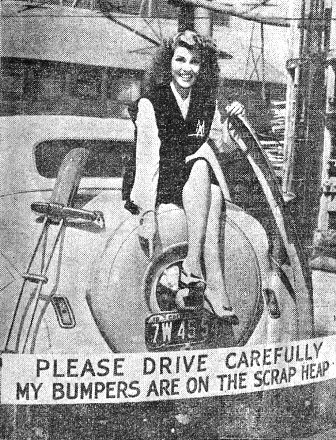 HER BUMPERS ARE IN THE SCRAP - Joining in the nationwide scrap metal drive, film star Rita Hayworth has sacrificed
her auto bumpers. Her example is said to have influenced some of the public to do likewise.
HER BUMPERS ARE IN THE SCRAP - Joining in the nationwide scrap metal drive, film star Rita Hayworth has sacrificed
her auto bumpers. Her example is said to have influenced some of the public to do likewise.
|
Because three telephones were unusable after the first raid it was at first believed that there might have been sabotage. Investigation proved, strangely enough, that three demolition bombs had neatly severed the wires of each phone where it left the buildings in which the instruments were located.
NO SABOTAGE
On the ironic side of the picture, Moore said, was the fact that the boys who had shied away from digging slit trenches were eager to dig after the first raid and those pilots who looked upon airplane camouflage with disdain became camouflage artists overnight.
Judging by the fact that the invaders dropped their belly tanks in the Naga Hills, they probably came from Magwe or Mandalay, Moore thinks, and the object was undoubtedly to knock out the air freight line to China. The colonel thinks it significant that the Jap was only able to muster 50 percent of his first raid strength when he returned for the second.
"If we can lick the Jap as badly as we've licked them outside Kunming, they'll be just as afraid of us as they are of Kunming," Moore concluded.
JAPS HIT AMERICAN FIELD THIRD TIME
In a third sweep on American airfields in Northeast Assam the enemy lost two planes, probably lost another and received damage to six.
The attack took place October 28, according to a communiqu from Brigadier General Clayton Bissell, commanding the 10th U.S. Air Force, and was made in considerable force. Our fighters were up to meet it.
One fighter and a bomber were definitely destroyed by Lt. Kermet C. Hynds, it was reported, while Lt. John L. Yantis knocked down one bomber. Lt. William R. Rogers
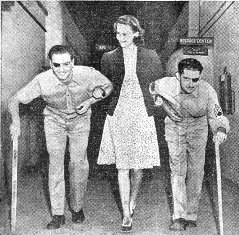 THE HALT, THE LAME AND THE BLIND! - The air corps asked for 36 green eye shades and the S.O.S. sent them the eye
patches seen above. It affected some of the boys' subconscious causing them to tap about with canes and sit in the halls
with tin cups. Doreen Palmer is leading Pvt. Nicholas Bruno and T/Sgt. Robert C. Gifford.
THE HALT, THE LAME AND THE BLIND! - The air corps asked for 36 green eye shades and the S.O.S. sent them the eye
patches seen above. It affected some of the boys' subconscious causing them to tap about with canes and sit in the halls
with tin cups. Doreen Palmer is leading Pvt. Nicholas Bruno and T/Sgt. Robert C. Gifford.
|
One fighter and one bomber were damaged by Lt. Leonard R. Sicks and one bomber was damaged by Lt. Virgil Burge. There was little damage to ground installations and none to our planes either on the ground or in the air, the communiqu said.
SHADES OF FLOYD GIBBONS
Somebody once wrote "in the country of the blind the one-eyed man is king."
The S.O.S. apparently thinks the 10th Air Force has a decidedly regal aspect and here are the gory details of the case:
A long time ago Capt. Matthew Mautz, signal supply officer for the Air Service Command, requisitioned 36 each, eye shades, visor type, green, from the S.O.S. What they got back was 36 eye patches for poor souls minus an eye-ball or two.
Said Capt. Mautz: "At first I thought I'd send them back with the request that they be equipped with doughnut holes, however doughnut holes are not listed in the Table of Basic Allowances.
"In as much as these shades were ordered for men in the radio room, it was suggested that each be given two, thereby enhancing the security of the radio room."
CHINA AIR FORCE CONTINUES OFFENSIVE
Chungking - After plastering Linsi, Hong Kong and Canton, the China Air Task Force last week transferred its attention to Burma. A flight of 27 B-25's with fighter escort roared over the Himalayas striking Lashio. Heavy anti-aircraft fire was encountered according to a communiqu issued by General Stilwell's headquarters here, but one battery was put out of commission by a direct bomb hit. Despite the heavy anti-aircraft fire, all planes returned safely to their bases.
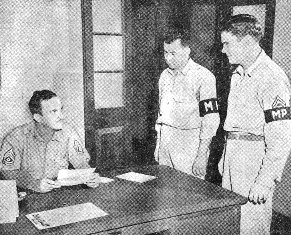 THEM BUMS - It is traditional in the Army to always refer to an MP with the proper descriptive adjective before his name.
MP's are used to it and accept it as part of the cross they must bear. Here we have 1st Sgt. James W. Pierce
issuing instructions to T/5 James F. Ballentyne and T/5 Paul J. Courtney who are about to go out on patrol.
THEM BUMS - It is traditional in the Army to always refer to an MP with the proper descriptive adjective before his name.
MP's are used to it and accept it as part of the cross they must bear. Here we have 1st Sgt. James W. Pierce
issuing instructions to T/5 James F. Ballentyne and T/5 Paul J. Courtney who are about to go out on patrol.
|
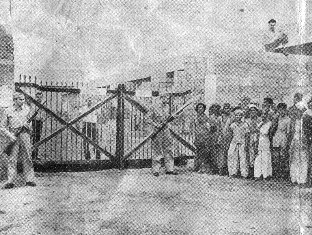 MUTUAL ADMIRATION - MP's are called upon to do many varied jobs in India. They not only must walk the streets at
night to keep overly exuberant GI's out of trouble but they must protect United States Army property. During the recent
disturbances in India concern was felt that excited groups of Indians might molest Army property. Such was never the case
and judging by the grins on the Indians' faces as they gather around smirking MP's, the whole thing became a mutual
admiration society.
MUTUAL ADMIRATION - MP's are called upon to do many varied jobs in India. They not only must walk the streets at
night to keep overly exuberant GI's out of trouble but they must protect United States Army property. During the recent
disturbances in India concern was felt that excited groups of Indians might molest Army property. Such was never the case
and judging by the grins on the Indians' faces as they gather around smirking MP's, the whole thing became a mutual
admiration society.
|
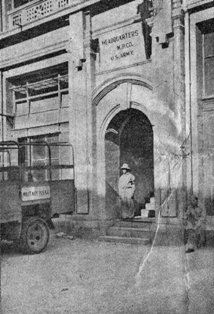
|
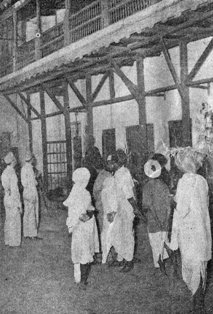
|
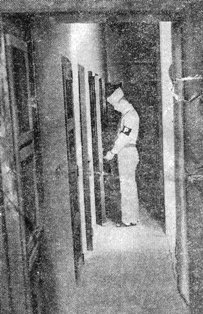
|
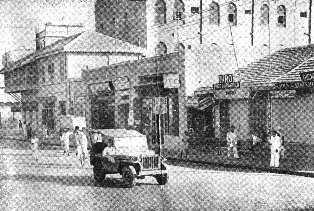 JEEP PATROL - During daylight hours a lot of patrolling is done in Jeeps. In this way much wider areas may be
covered and the Jeep has now become one of the foremost means of apprehending
violators of speed regulations. In all
large American stations speed laws have been posted for Army trucks and sedans.
JEEP PATROL - During daylight hours a lot of patrolling is done in Jeeps. In this way much wider areas may be
covered and the Jeep has now become one of the foremost means of apprehending
violators of speed regulations. In all
large American stations speed laws have been posted for Army trucks and sedans.
|
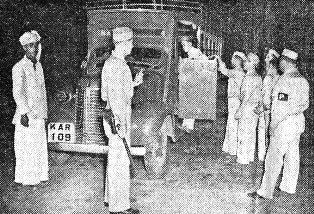 HEADIN' FOR HOME - In some areas buses are provided to transport soldiers between outlying camps and towns.
Again the M.P. is called on to supervise these movements and make sure everything is done strictly according to Hoyle -
or do you get what we mean? - The primary function of the Military Police, however, is one of protecting American soldiers
from possible "enemies" and even at times from themselves. The M.P. has a hard row to hoe and is generally a pretty good
guy. There is lack of motor transportation in India due to gasoline scarcity. Many camps are too far from town to take
tongas, so buses run on regular schedules for our soldiers. All photos by T/5 Nicholas Lyseczko.
HEADIN' FOR HOME - In some areas buses are provided to transport soldiers between outlying camps and towns.
Again the M.P. is called on to supervise these movements and make sure everything is done strictly according to Hoyle -
or do you get what we mean? - The primary function of the Military Police, however, is one of protecting American soldiers
from possible "enemies" and even at times from themselves. The M.P. has a hard row to hoe and is generally a pretty good
guy. There is lack of motor transportation in India due to gasoline scarcity. Many camps are too far from town to take
tongas, so buses run on regular schedules for our soldiers. All photos by T/5 Nicholas Lyseczko.
|
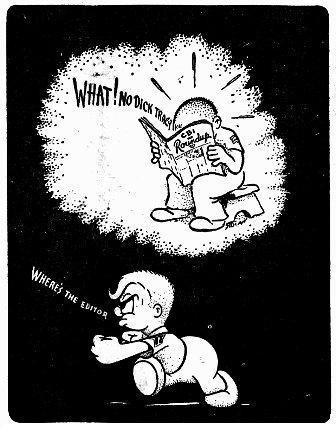
|
All you guys sweating it out up in Assam and way up in China better start writing letters to the States and sending little packages of goodies to buck up that home morale.
Things are really getting tough there and we've simply got to do our duty and not let them down.
For instance, construction workers earning $80 a week are going to have to pay a simply terrible income tax. Your best girl just can't get silk hose any more, so if her ankles are a bit thick she's got to grin and bear it with cotton or lisle jobs.
Then take college football - the coaches are now all directors of physical education for the services and their old schools are usually getting trimmed by the service boys. If and when they start drafting 18-year-olds you'll see Brooklyn High romping around Yankee Stadium - not Columbia.
And then there's the question of gas rationing. People are actually going to be limited to 5,000 miles of driving per year on the West Coast. Pretty rugged isn't it. But that's only half the story. Don't forget that everybody now has to drive 35 miles an hour making it twice as tough to run over pedestrians as before.
Economic Stabilization Director James F. Byrnes has just issued regulations for 1943 limiting salaries to $25,000 after income taxes, insurance premiums and contributions to charitable organizations have been deducted. How are some of those movie producers ever going to struggle along on that sort of deal? President Roosevelt has instructed Byrnes to give him the same treatment.
Just think of the folks back home having to go through "Meatless Tuesdays!" Heresy! Luggage makers are now using plywood instead of metals, and the kids will have to do without fish hooks and circuses.
What the hell is there left to go home to?
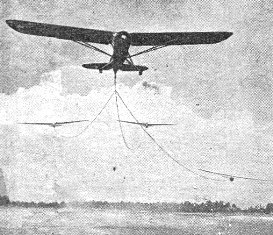
|
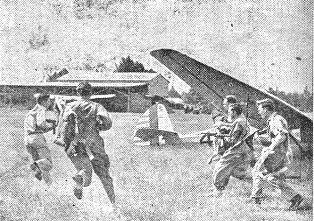
|
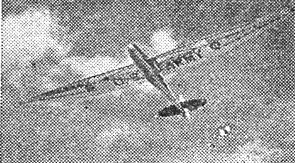
|
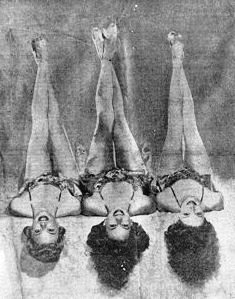 HOLLYWOOD HANDICRAFT - They're using the same tricks to publicize new movies back home. Leslie Brooks, Jinx
Falkenburg and Kay Harris are the pretty gals. The press agent says the name of the picture is "Lucky Legs."
HOLLYWOOD HANDICRAFT - They're using the same tricks to publicize new movies back home. Leslie Brooks, Jinx
Falkenburg and Kay Harris are the pretty gals. The press agent says the name of the picture is "Lucky Legs."
|
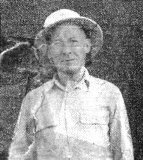
|
Sgt. Has 30 Years Service
Last month T/Sgt. James J. Powers, a member of a service squadron somewhere in India, passed the milestone of 30 years honorable service in the United States Army.
"Jimmy" has often said, "I will do another hitch, that is, if my guardian will sign the papers." This statement is an example of his devotion to the service, to his country and to his fellow soldiers.
Powers first enlistment dates back to November 22, 1911, which is just about the time that some of us were wearing three-cornered pants. "Jimmy" saw action in World War I, and was on the guard staff of General John J. Pershing.
140-TON AIR PLANES COMING
Boston - In an interview here, Henry Kaiser declared that the mammoth experimental cargo plane which he is building with the sanction of WPB, will be more than double the size of the 70-ton "Glenn Martin Flying Boat, Mars" and will probably be in construction before the final tests are finished, so that mass production of the planes may begin immediately after official approval has been gained.

WE SWOOP AT DAWN The pilot strode into the evening gloom. From the hooded light of the operations room. He looked long and hard at the cloud flecked sky. There was a telltale twinkle in his clear blue eye As he said to his crew scattered on the lawn, "String your hair girls, we swoop at dawn." We filled our tanks, and each man checked his gun For to-morrow's party would be no fun. The ship was made ready, and the rest of the night Our sleep was disturbed by dreams of the flight. It is always so when brave men fly, Not a pleasant thought, "To-morrow, I may die." No matter how many missions a man may fly, He never gets over being afraid to die It's a funny old feeling, hard to explain You tighten all up from your toes to your brain, Your stomach's all empty, and your face feels drawn When you hear the old cry, "We swoop at dawn!" We were awakened at three by a sleepy O.D. And had a foul breakfast of sourdough and tea. Then off to the briefing in a loaded-down truck Where some simple dodo tells us, "If you have luck- You'll sink a carrier and bomb a 'drome You'll all be heroes when you get back home. But the man who went out into the morning cold Thought not of medals and heroes bold Most likely the thought of their girls and their homes And the hell they'd give those yellow gnomes For causing the war, the pain and the strife, And for taking away the best years of their life. The roar of the fans was like a beautiful song, We'd be in the air now before very long. The pilot gunned the engines - We began to roll. We picked up speed as the props took hold The big ship labored, the air filled with sound, "Wheel up" cried the pilot, "We're off the ground." We joined formation - buzzed the field below, It's a fine old custom in the Air Corps, you know, Then away on course, it was lovely to see- Nine big ships in flights of three. Up over the mountains and soon we were gone Right on schedule - at the break of dawn. The leader looked at his watch and noted the time, He adjusted his throttles and started to climb He then glanced back at the men on his wing, The weather was stinking - The usual thing. But we closed up tight and pushed right on through 'Til we finally broke out in the upper blue. We continued to climb for well we knew If we went in low, our chances were few So we went in high-way up in the blue. Proud to be the lads who take them through. If this old war has got to be As long as I last - it's combat for me. |
|
And my breath comes in jerks, and my heart beats fast, I'd rather do my bit up here in the blue Than sit on the ground like some jokers do. I'm doing my part and none can say "He takes the war the easiest way." Now we're over the target, and my heart skips a beat, The altimeter's pushing thirty thousand feet The bomb bays open and the run is begun This time it's for keeps and not for fun Then over the interphone calm and clear "Bombs away" is the cry from the bombardier. Watch them fall - the boom has been lowered "Good work, old man, it looks like we scored So pour on the coal and close the doors We're proud of this job - my work and yours." The engines turn over in an endless moan As we make a steep bank and head for home. The ack-ack's not bad - it's way down below But that's not what we fear the most from the foe "There they are!" You can see they're coming up fast. The Zeros are coming, they've caught us at last. They're fast little or more, But we're ready and waiting, we'll even the score. Pass after pass from above and head-on But our gunners are good and they put them to scorn It's a long running fight, and the stakes are high. It's bombers versus fighters and someone will die We tighten formation, and all I can think Is, "Jesus, I'd hate to go done in the drink." It's all over now - they've had enough Forty minutes of hell and the going was tough The top gunner's happy, he got two of the Nips But the side gunner's dead the tails full of rips We'll make it back if the engines hold out, But we'll miss the side gunner, the big country lout. It's always that way when a good man goes west, We miss him most who knew him best He lived with us, fought with us, gave us his all. he died to save us - he was right on the ball He stuck by his guns, his aim was true But for his last bursts we'd all have been through. So we come back home in the late afternoon Through weather and ice and it's none to soon The gages read low when we get there at last Thank God we're home - We were sweating that gas. He sets her down - a good landing that. And he's tireder than I am. I'll bet you my hat. The big ship slows down and rolls to a stop The ambulance is there and so is the doc "It's no use, fellow - he's gone, you see He gave his all for the crew and me, So handle him easy and send a cable through He died for his country like he'd have wanted to." So we'll all go to town and get drunk as a skunk And try to forget war and fighting and bunk It's been a rough day but cheer up, lad We have to-morrow off, so it's not so bad Then by the time your hangover's gone. We'll be ready again to "Swoop at Dawn." - Capt. John W. Carpenter III |
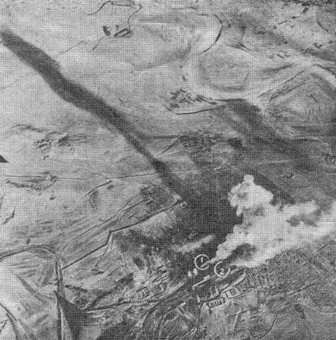
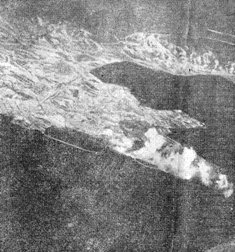
|
|
HONG KONG, LINSI PICTURES LINSI MINES SMASHED - At left is the photographic proof of what happened to the Linsi mines when the China Air Task Force attacked them as reported in last week's Roundup. The main target was the power station shown sending up white smoke in circle 1. The dense clouds of black smoke (circle 2) are from a mine head struck by our bombs. The columns of smoke rose 10,000 feet into the air. Note the smoke shadow on the left. 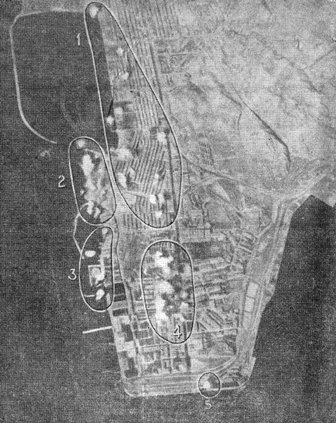
|
HONG KONG AT LAST - It was sweet music to hear that our bombers based in China had ranged as far as Hong Kong to give the Jap the business. In the picture, above right, circle one shows a trail of incendiaries in building and barracks areas. Circle 2 shows the docks being bombed while three encloses the jetties. Four is of direct hits in the warehouse area while five is a picture of a direct hit on a rail junction. The picture above left, is a long shot of the whole Hong Kong area taken three minutes after the bombing. The columns of smoke could be seen for 40 miles by the returning crews of our bombers.
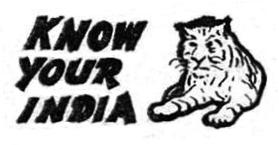
|
You will see unfamiliar sights in the streets. Two grown men walking along hand in hand doesn't mean what you may think it means - Indian men sometimes walk that way with a friend. Indians chew betel as much as we smoke cigarettes. The betel nut is wrapped in a leaf buttered with lime. The wad is chewed as tobacco is chewed in America, but the juice is red. When you are offered betel or any gift you may just touch it if you don't want to take it. Touching the gift means that you have accepted it in the spirit in which it was offered.
A storekeeper will usually ask you more for his goods than he expects to get. It is legitimate to bargain with him; it is sort of a game. They expect to be beaten down to anywhere from two-thirds to one-third of their asking price. Everyone bargains, but they do it politely and with good humor. This is true only for the small Indian stores; the large stores of the English and American type have fixed prices.
It is a good idea to settle the taxi fare of rickshaw fare before you get in. Get the price of any service fixed in advance or there may be loud fuss when the time comes to pay.
Most Indians in civil life have a different idea about time we have. If a man tells you he will come at five o'clock, he usually doesn't mean a t five sharp, but somewhere within an hour or two of five. And if you instruct a workman to be finished with a job by Tuesday, he may understand you to mean some day not before Tuesday. You can get things done quickly, Indian workmen can deliver in a pinch, but you must keep a close check on the progress of the job.
All work stops during the big holidays. Holi is a spring holiday, something like our Halloween in spirit. Red or yellow powder is thrown around as we throw confetti, and colored water is squirted in water fights. Diwali is the "feat of lamps" when every city and village is ablaze with lights. The Dashara or Dasera comes in October. All Hindus pay respects to the tools of their trade then.
The main Moslem holiday is Muharram, a ten day period of mourning and fasting in March. On Bakar Id, sacrifices are made in memory of Abraham's offering of Ishmael, which the version of the Koran.
You will see more beggars with more pitiful faces than you have ever set eyes on before. But if you give something to one, you may soon have ten crowding around you - especially at railway stations. Better wait until you have been in the country for a while before you give much money to beggars. There are many Sannyasis, holy men who
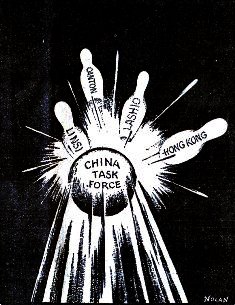
|
It will be interesting to visit temples and mosques, but do not go in unless you have someone to take you inside and guide you around. You may have to take off your shoes as it is not considered respectful to wear shoes in a house of worship. ordinarily you can take photographs freely, but always ask permission to do so first. Some people object to being photographed; some sacred ceremonies and objects should not be photographed any more than it is respectful to take snapshots during a solemn church occasion at home. So inquire before you unlimber your cameras or you may find yourself in a mob scene. Wherever you go, people may crowd around you, especially where American soldiers have not been seen before. The only way to shake the crowd is to go away fast. The quickest way out of a jam (if you should get into one in spite of all this fine advice) is to find a cop. He'll be on your side no matter what (almost), and will help get you clear. Never strike an Indian. They do not know how to box; one punch will knock an Indian down. But you would make enemies of everyone that saw you, and word would soon spread that all Americans hit people in the jaw. Some Indians fight with knives, and they are a lot better at this than you are. Most Indians are courteous by nature, and they want to understand and please you. As long as you are courteous, they will realize that you mean well even if you make a social error and they will not resent it.
The C.B.I. Roundup is a weekly newspaper published by and for the men of the United States Army Forces in China, Burma, and India, from news and pictures supplied by staff members, soldier correspondents, Office of War Information and other sources. The Roundup is published Thursday of each week and is printed by The Statesman in New Delhi, India. Editorial matter should be sent directly to Capt. Fred Eldridge, Branch Office Hq., U.S.A.F.C.B.I., New Delhi, and should arrive not later than Monday in order to make that week's issue. Pictures must arrive by Sunday and must be negatives or enlargements. Stories should contain full name and organization of sender.

NOVEMBER 5, 1942
Original issue of C.B.I. Roundup shared by Jan and Carol Benroth
on behalf of CBI Veteran James W. Benroth
Copyright © 2006 Carl Warren Weidenburner. All rights reserved.
TOP OF PAGE PRINT THIS PAGE ABOUT THIS PAGE SEND COMMENTS
PREVIOUS ISSUE CLOSE THIS WINDOW NEXT ISSUE